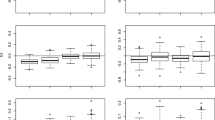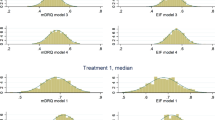Abstract
Causal inference and missing data have attracted significant research interests in recent years, while the current literature usually focuses on only one of these two issues. In this paper, we develop two multiply robust methods to estimate the quantile treatment effect (QTE), in the context of missing data. Compared to the commonly used average treatment effect, QTE provides a more complete picture of the difference between the treatment and control groups. The first one is based on inverse probability weighting, the resulting QTE estimator is root-n consistent and asymptotic normal, as long as the class of candidate models of propensity scores contains the correct model and so does that for the probability of being observed. The second one is based on augmented inverse probability weighting, which further relaxes the restriction on the probability of being observed. Simulation studies are conducted to investigate the performance of the proposed method, and the motivated CHARLS data are analyzed, exhibiting different treatment effects at various quantile levels.
Similar content being viewed by others
References
Bang, H., Robins, J.M.: Doubly robust estimation in missing data and causal inference models. Biometrics 61, 962–973 (2005)
Cai, Z.W., Fang, Y., Lin, M., Tang, S.F.: Inferences for partially conditional quantile treatment effect model. Technical Report 202005, Department of Economics, University of Kansas (2020)
Chen, C.X., Shen, B.Y., Liu, A.Y., Wu, R.L., Wang, M.: A multiple robust propensity score method for longitudinal analysis with intermittent missing data. Biometrics 77(2), 519–532 (2021)
Chen, L.J., Li, D.Y., Zhou, C.: Distributed inference for the extreme value index. Biometrika 109(1), 257–264 (2021)
Chen, X., Liu, W.D., Zhang, Y.C.: Quantile regression under memory constraint. Ann. Stat. 47(6), 3244–3273 (2019)
Christelis, D., Dobrescu, L.I.: The causal effect of social activities on cognition: evidence from 20 European countries. Soc. Sci. Medi. 247, 1–9 (2020)
Donald, S., Hsu, Y.C.: Estimation and inference for distribution functions and quantile functions in treatment effect models. J. Econom. 178, 383–397 (2014)
Firpo, S.: Efficient semiparametric estimation of quantile treatment effects. Econometrica 75(1), 259–276 (2007)
Han, P.S., Kong, L.L., Zhao, J.W., Zhou, X.C.: A general framework for quantile estimation with incomplete data. J. R. Stat. Soc. Ser. B (Stat. Methodol.) 81(2), 305–333 (2019)
Han, P.S., Wang, L.: Estimation with missing data: beyond double robustness. Biometrika 100, 417–430 (2013)
Han, P.S.: Multiply robust estimation in regression analysis with missing data. J. Am. Stat. Assoc. 109(507), 1159–1173 (2014)
Hernán, M.A., Robins, J.M.: Causal Inference: What If. Chapman & Hall/CRC, Boca Raton (2020)
Hu, Y.Q., Lei, X.Y., Smith, J.P., Zhao, Y.H.: Effects of social activities on cognitive functions: evidence from CHARLS. In: Aging in Asia: Findings From New and Emerging Data Initiatives, pp. 279–308, Chap. 12. National Academies Press (US), Washington (2012)
Imbens, G.W., Rubin, D.B.: Causal Inference for Statistics, Social, and Biomedical Sciences: An Introduction. Cambridge University Press, Cambridge (2015)
Lin, H.Z., Zhou, F.Y., Wang, Q.X., Zhou, L., Qin, J.: Robust and efficient estimation for the treatment effect in causal inference and missing data problems. J. Econom. 205(2), 363–380 (2018)
Liu, H.X., Fan, X.J., Luo, H.Y., Zhou, Z.L., Shen, C., Hu, N.B., Zhai, X.M.: Comparison of depressive symptoms and its influencing factors among the elderly in urban and rural areas: evidence from the china health and retirement longitudinal study (CHARLS). Int. J. Environ. Res. Public Health 18(8), 3886 (2021)
Lunceford, J.K., Davidian, M.: Stratification and weighting via the propensity score in estimation of causal treatment effects: a comparative study. Stat. Med. 23, 2937–2960 (2004)
Melly, B.: Estimation of counterfactual distributions using quantile regression. University of St.Gallen, Monograph (discussion paper) (2006)
Rosenbaum, P.R., Rubin, D.B.: Reducing bias in observational studies using subclassification on the propensity score. J. Am. Stat. Assoc. 79(387), 516–524 (1984)
Rosenbaum, P.R., Rubin, D.B.: The central role of the propensity score in observational studies for causal effects. Biometrika 70(1), 41–55 (1983)
Rubin, D.B.: Multiple Imputation for Nonresponse in Surveys. Wiley, New York (2004)
Seaman, S.R., White, I.R.: Review of inverse probability weighting for dealing with missing data. Stat. Methods Med. Res. 22, 278–295 (2013)
Tan, Z.Q.: Bounded, efficient and doubly robust estimation with inverse weighting. Biometrika 97(3), 661–682 (2010)
Wei, Y., Ma, Y.Y., Carroll, R.J.: Multiple imputation in quantile regression. Biometrika 99, 423–438 (2012)
Xie, Y.Y., Cotton, C., Zhu, Y.Y.: Multiply robust estimation of causal quantile treatment effects. Stat. Med. 39, 4238–4251 (2020)
Zhang, Y.C.: Extremal quantile treatment effects. Ann. Stat. 46(6B), 3707–3740 (2018)
Zhang, Z.W., Chen, Z., Troendle, J.F., Zhang, J.: Causal inference on quantiles with an obstetric application. Biometrics 68, 697–706 (2012)
Acknowledgements
The authors would like to thank two anonymous reviewers, an associate editor and the editor for constructive comments and helpful suggestions. This publication is based upon work partially supported by National Natural Science Foundation of China grants 11871376 and 11871164, Natural Science Foundation of Shanghai 21ZR1420700 and Open Research Fund of KLATASDS-MOE.
Author information
Authors and Affiliations
Corresponding authors
Ethics declarations
Conflict of interest
The authors declared no potential conflicts of interest with respect to the research, authorship, and/or publication of this article.
Supplementary Information
Below is the link to the electronic supplementary material.
Supplementary information
The online Supplemental Materials include some notations used in asymptotic properties and all technical proofs. (pdf 410KB)
Rights and permissions
Springer Nature or its licensor (e.g. a society or other partner) holds exclusive rights to this article under a publishing agreement with the author(s) or other rightsholder(s); author self-archiving of the accepted manuscript version of this article is solely governed by the terms of such publishing agreement and applicable law.
About this article
Cite this article
Wang, X., Qin, G., Tang, Y. et al. Multiply Robust Estimation of Quantile Treatment Effects with Missing Responses. Commun. Math. Stat. (2023). https://doi.org/10.1007/s40304-023-00380-4
Received:
Revised:
Accepted:
Published:
DOI: https://doi.org/10.1007/s40304-023-00380-4




